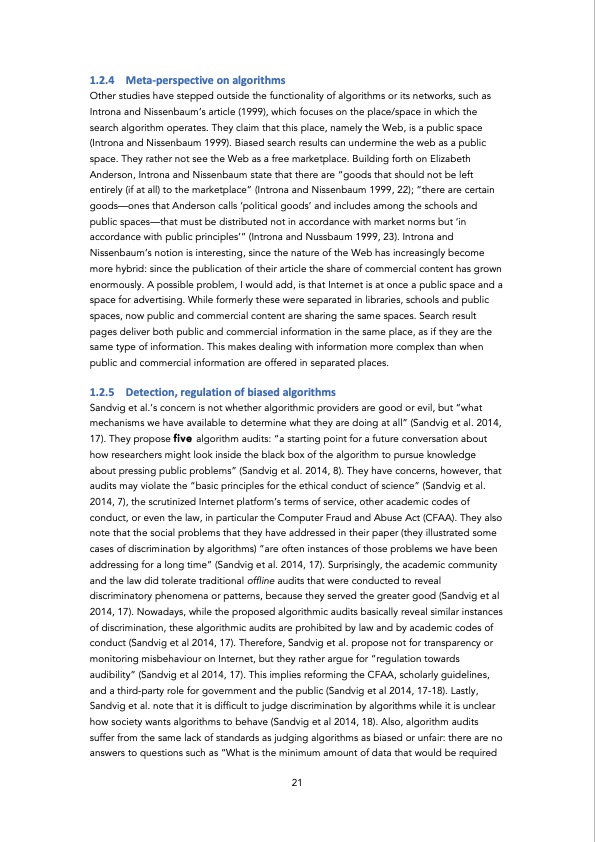
PDF Publication Title:
Text from PDF Page: 021
1.2.4 Meta-perspective on algorithms Other studies have stepped outside the functionality of algorithms or its networks, such as Introna and Nissenbaum’s article (1999), which focuses on the place/space in which the search algorithm operates. They claim that this place, namely the Web, is a public space (Introna and Nissenbaum 1999). Biased search results can undermine the web as a public space. They rather not see the Web as a free marketplace. Building forth on Elizabeth Anderson, Introna and Nissenbaum state that there are “goods that should not be left entirely (if at all) to the marketplace” (Introna and Nissenbaum 1999, 22); “there are certain goods—ones that Anderson calls ‘political goods’ and includes among the schools and public spaces—that must be distributed not in accordance with market norms but ‘in accordance with public principles’” (Introna and Nussbaum 1999, 23). Introna and Nissenbaum’s notion is interesting, since the nature of the Web has increasingly become more hybrid: since the publication of their article the share of commercial content has grown enormously. A possible problem, I would add, is that Internet is at once a public space and a space for advertising. While formerly these were separated in libraries, schools and public spaces, now public and commercial content are sharing the same spaces. Search result pages deliver both public and commercial information in the same place, as if they are the same type of information. This makes dealing with information more complex than when public and commercial information are offered in separated places. 1.2.5 Detection, regulation of biased algorithms Sandvig et al.’s concern is not whether algorithmic providers are good or evil, but “what mechanisms we have available to determine what they are doing at all” (Sandvig et al. 2014, 17). They propose five algorithm audits: “a starting point for a future conversation about how researchers might look inside the black box of the algorithm to pursue knowledge about pressing public problems” (Sandvig et al. 2014, 8). They have concerns, however, that audits may violate the “basic principles for the ethical conduct of science” (Sandvig et al. 2014, 7), the scrutinized Internet platform’s terms of service, other academic codes of conduct, or even the law, in particular the Computer Fraud and Abuse Act (CFAA). They also note that the social problems that they have addressed in their paper (they illustrated some cases of discrimination by algorithms) “are often instances of those problems we have been addressing for a long time” (Sandvig et al. 2014, 17). Surprisingly, the academic community and the law did tolerate traditional offline audits that were conducted to reveal discriminatory phenomena or patterns, because they served the greater good (Sandvig et al 2014, 17). Nowadays, while the proposed algorithmic audits basically reveal similar instances of discrimination, these algorithmic audits are prohibited by law and by academic codes of conduct (Sandvig et al 2014, 17). Therefore, Sandvig et al. propose not for transparency or monitoring misbehaviour on Internet, but they rather argue for “regulation towards audibility” (Sandvig et al 2014, 17). This implies reforming the CFAA, scholarly guidelines, and a third-party role for government and the public (Sandvig et al 2014, 17-18). Lastly, Sandvig et al. note that it is difficult to judge discrimination by algorithms while it is unclear how society wants algorithms to behave (Sandvig et al 2014, 18). Also, algorithm audits suffer from the same lack of standards as judging algorithms as biased or unfair: there are no answers to questions such as “What is the minimum amount of data that would be required 21PDF Image | peek into the discursive construction of the Google Search Algorithm: A critical discourse analysis

PDF Search Title:
peek into the discursive construction of the Google Search Algorithm: A critical discourse analysisOriginal File Name Searched:
thesis-google-search-algotithm.pdfDIY PDF Search: Google It | Yahoo | Bing
Cruise Ship Reviews | Luxury Resort | Jet | Yacht | and Travel Tech More Info
Cruising Review Topics and Articles More Info
Software based on Filemaker for the travel industry More Info
The Burgenstock Resort: Reviews on CruisingReview website... More Info
Resort Reviews: World Class resorts... More Info
The Riffelalp Resort: Reviews on CruisingReview website... More Info
| CONTACT TEL: 608-238-6001 Email: greg@cruisingreview.com | RSS | AMP |